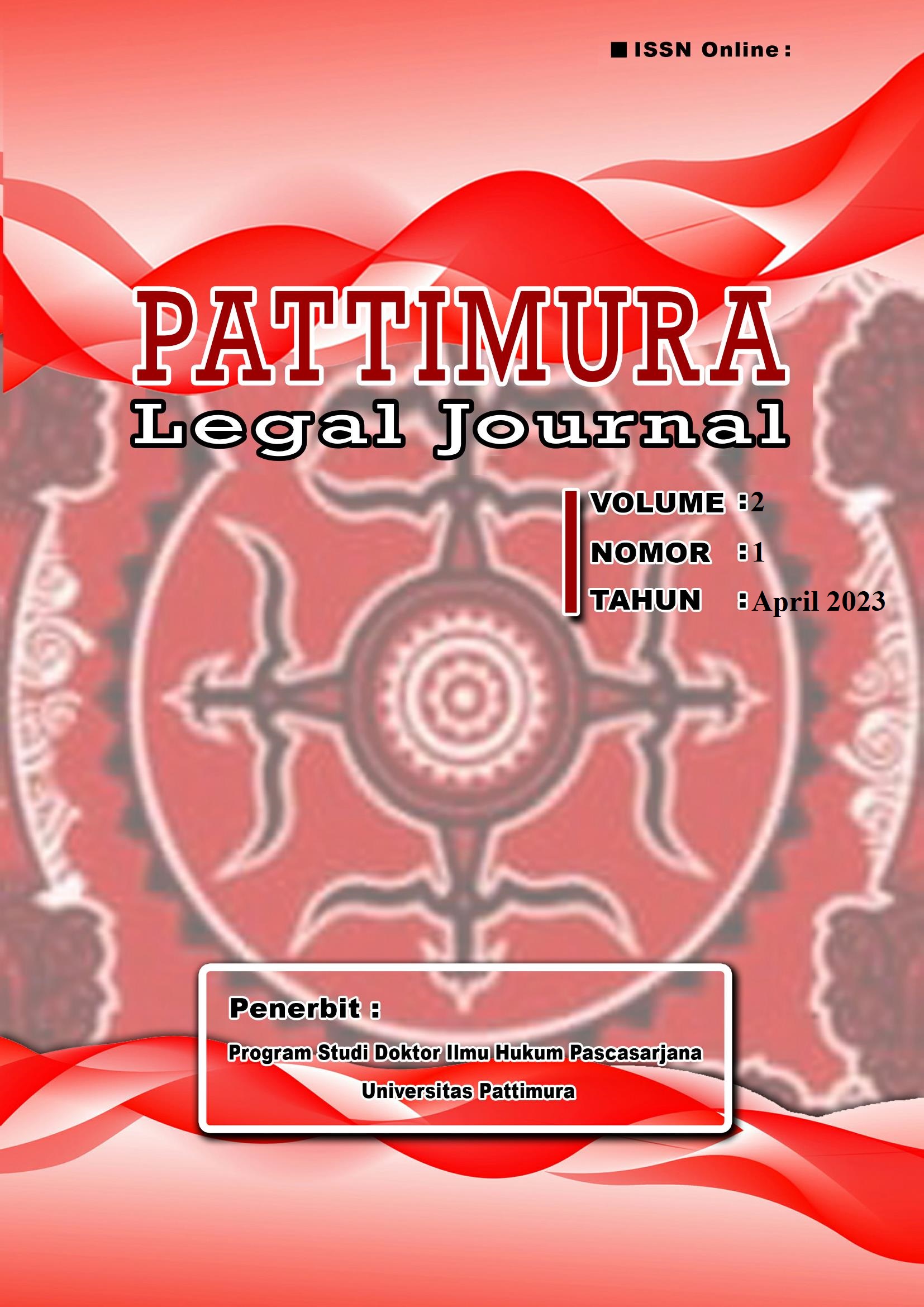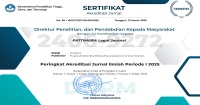Penanganan Tindak Pidana Viral: Reduksi Terhadap Asas Legalitas Ke Asas Viralitas
Handling Viral Crimes: Reducing the Principle of Legality to the Principle of Virality
Abstract
Introduction: The handling of a number of criminal cases that have befallen victims and reported to the police, must first meet a number of dead ends. The justice that the victim expects from the case that happened to him must wait until the case goes viral and creates a reaction and public pressure.
Purposes of the Research: This study aims to answer how to reduce and shift the principle of legality to the principle of "virality". This is because the handling of viral crimes first and then handled by the police has actually reduced and shifted the position of the principle of legality as the most fundamental principle in Indonesian criminal law.
Methods of the Research: This study uses a normative research type. The approach used is a case approach, a statute approach and a conceptual approach.
Results Originality of the Research: The results of the study show that the principle of legality as stipulated in Article 1 paragraph (1) of the Criminal Code which emphasizes that there is no act that can be punished without being regulated and stipulated in statutory regulations before the act is committed, has experienced reduction and shifted to nothing. an act that can be punished without going viral first. In other words, the principle of legality has been reduced from no criminal and criminal acts without prior law, to no criminal and criminal acts without going viral first.
Downloads
References
Jurnal
Anjari, Warih. “Kedudukan Asas Legalitas Pasca Putusan Mahkamah Konstitusi Nomor 003/PUU-IV/2006 Dan 025/PUU-XIV/2016.” Jurnal Konstitusi 16, no. 1 (1 April 2019): 1–22. https://doi.org/10.31078/jk1611.
Citranu. “Asas Legalitas Sebagai Pondasi Hukum Pidana Persfektif Filsafat Hukum.” Belom Bahadat 9, no. 1 (30 Juni 2019). https://doi.org/10.33363/bb.v8i1.343.
Genta, Yehezkiel. “Reinterpretasi Makna Asas Legalitas Sebagai Bentuk Pengakuan Hukum Pidana Adat Dalam Upaya Menjamin Hak Asasi Masyarakat Adat.” Padjadjaran Law Review 7, no. 1 (2019): 46–55.
Grecya, Elsa, dan Ilham Effendi Yahya. “Improving Civic Engagement through ‘No Viral No Justice’ Phenomenon.” Journal Civics and Social Studies 6, no. 1 (22 Juni 2022): 51–59. https://doi.org/10.31980/civicos.v6i1.1629.
Hafizah, Annisa, Madiasa Ablisar, dan Rafiqoh Lubis. “Asas Legalitas Dalam Hukum Pidana Indonesia Dan Hukum Pidana Islam.” Mahadi: Indonesia Journal of Law 1, no. 1 (10 Februari 2022): 1–10.
Khasan, Mohamad. “Analisis Yuridis Normatif Asas Legalitas RUU-Hukum Pidana Dan Asas Legalitas Hukum Pidana Islam.” Isti`dal : Jurnal Studi Hukum Islam 5, no. 2 (2018): 096–112. https://doi.org/10.34001/istidal.v5i2.1315.
Sofyan, Andi, dan Hj. Nur Azisa. Buku Ajar Hukum Pidana. Makassar: Pustaka Pena Press, 2016.
Buku
lyas, Amir. Asas-Asas Hukum Pidana : Memahami Tindak Pidana dan Pertanggung jawaban Pidana Sebagai Syarat Pemidanaan (Disertai teori-teori pengantar dan beberapa komentar). Yogyakarta: Rangkang Education, 2012.
Muammar. “Asas-asas Hukum.” Dalam Pengantar Ilmu Hukum, 121–40. Aceh: Yayasan Penerbit Muhammad Zaini, 2021.
Online/World Wide Web, Disertasi/Tesis/Skripsi, Dan Lain-Lain
Budi, Mulia. “Muncul Fenomena Kasus Viral Lalu Baru Diusut, Kapolri Minta Ada Evaluasi.” https://news.detik.com/, Desember 2021. https://news.detik.com/berita/d-5859278/muncul-fenomena-kasus-viral-lalu-baru-diusut-kapolri-minta-ada-evaluasi.
Habsy, M. Hafiz Al. “Belajar dari Fenomena ‘No Viral No Justice.’” detiknews, 4 Januari 2022. https://news.detik.com/kolom/d-5883436/belajar-dari-fenomena-no-viral-no-justice.
https://hukum.ub.ac.id/. “Saat Korban jadi Tersangka & Kasus Viral Dulu Baru Polisi Bertindak,” 16 Februari 2023. https://hukum.ub.ac.id/saat-korban-jadi-tersangka-kasus-viral-dulu-baru-polisi-bertindak/.
Indonesia, C. N. N. “Deret Kasus Ditangani Polri Usai Viral, Picu Tagar #NoViralNoJustice.” nasional, Desember 2021. https://www.cnnindonesia.com/nasional/20211218125433-12-735632/deret-kasus-ditangani-polri-usai-viral-picu-tagar-noviralnojustice.
Lubabah, Raynaldo Ghiffari. “DPR Soal Tagar #PercumaLaporPolisi: Jangan Tunggu Kasus Viral Baru Ditangani.” www.merdeka.com, 19 Desember 2021. https://www.merdeka.com/peristiwa/dpr-soal-tagar-percumalaporpolisi-jangan-tunggu-kasus-viral-baru-ditangani.html.
Media, Kompas Cyber. “Fenomena “No Viral No Justice", Ini 4 Kasus yang Baru Ditangani Polisi setelah Viral di Medsos.” KOMPAS.com, 17 Desember 2021. https://nasional.kompas.com/read/2021/12/17/17514801/fenomena-no-viral-no-justice-ini-4-kasus-yang-baru-ditangani-polisi-setelah.
Pradiva, I. Gusti Ngurah Bayu, dan Diah Ratna Sari Hariyanto. “Perluasan Asas Legalitas Dalam RKUHP Sebagai Upaya Pembaharuan Hukum Pidana Indonesia.” Kertha Semaya : Journal Ilmu Hukum 10, no. 8 (28 Juni 2022): 1766–78. https://doi.org/10.24843/KS.2022.v10.i08.p05.
Putra, Nanda Perdana. “HEADLINE: Kapolri Sikapi Fenomena No Viral No Justice, Momentum Pembenahan Internal?” www.liputan6.com, 22 Desember 2021. https://www.liputan6.com/news/read/4819367/headline-kapolri-sikapi-fenomena-no-viral-no-justice-momentum-pembenahan-internal.
Shidarta. “Asas ‘Die normative Kraft des Faktischen.’” https://www.researchgate.net/. Unpublished, Oktober 2016. http://rgdoi.net/10.13140/RG.2.2.31986.84160.
———. “Asas ‘Legalitas.’” https://www.researchgate.net/, Februari 2016. https://www.researchgate.net/publication/354693090.
Copyright (c) 2023 Muammar Muammar (Author)

This work is licensed under a Creative Commons Attribution-NonCommercial 4.0 International License.
Authors who publish their manuscripts in this Journal agree to the following conditions:
- The copyright in each article belongs to the author, as well as the right to patent.
- Authors are able to enter into separate, additional contractual arrangements for the non-exclusive distribution of the journal's published version of the work (e.g., post it to an institutional repository or publish it in a book), with an acknowledgment of its initial publication in this journal.
- Authors are permitted and encouraged to post their work online (e.g., in institutional repositories or on their website) prior to and during the submission process, as it can lead to productive exchanges, as well as earlier and greater citation of published work.
- Authors have the right to self-archiving of the article (Author Self-Archiving Policy)






















